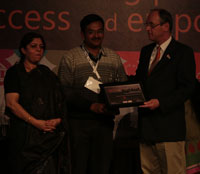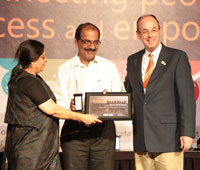e-Health, Winner 2013
 ThalCare is a web based application which aims at affordable and reliable care locally to individuals suffering from thalassemia. Thalcare manages vast amount of medical information and lab reports has ThalSense – an intelligence engine which processes the data to generate alerts, suggestions and indications for proper management of disease as per international guidelines for the local doctors.
ThalCare is a web based application which aims at affordable and reliable care locally to individuals suffering from thalassemia. Thalcare manages vast amount of medical information and lab reports has ThalSense – an intelligence engine which processes the data to generate alerts, suggestions and indications for proper management of disease as per international guidelines for the local doctors.
The application aims at making available affordable and reliable care locally to individuals suffer-ing from thalassemia by making use of technology and management.
It lays emphasis on 4 major factors:
- Management of Thalassemia.
- Prevention of Thalassemiac.
- Prevention of Thalassemiac.
- Exploring Possibilities of Complete Cure and preparing patients for the same.
- Counselling and other non-medical support for families.
Thalcare manages vast amount of medical information and lab reports. It has ThalSense – an in-telligence engine which processes the data to generate alerts, suggestions and indications for proper management of disease as per international guidelines for the local doctors. It tracks ad-herence to protocols both by local centres and the individuals. The application allows physicians and experts from remote locations to provide advice and care. It has smart phone applications, web based access and sms based access to medical records relating to the patient. This tool enables patients to manage their condition better and enhances adherence. It manages reports including some vital graphs and statistics of pre and post transfusion Hb, ferretin levels and parameters considered crucial in thalassemia care and management. This relieves the family of the burden to maintain records for years together. At the same time it makes it possible for physicians to get instant access to entire disease history on the system.
 Mobile Tele-Ophthalmology Units encompasses access to specialist eye care for remote patients, ophthalmic disease screening, monitoring, diagnosing and management, sharing of medical resources, collaboration on research and clinical trials, distance learning and continuing education. Tele-Ophthalmology unit is mobile based with WiMAX/KSWAN connectivity for early detection and treatment of blindness causing diseases.
Mobile Tele-Ophthalmology Units encompasses access to specialist eye care for remote patients, ophthalmic disease screening, monitoring, diagnosing and management, sharing of medical resources, collaboration on research and clinical trials, distance learning and continuing education. Tele-Ophthalmology unit is mobile based with WiMAX/KSWAN connectivity for early detection and treatment of blindness causing diseases.
The specialist doctors diagnose and provide treatment to the patient through videoconferencing and their prescription forms part of EMR and can be scanned and send to the mobile unit for delivering to the patients. In the mobile Telemedicine unit, the local doctors treat the patients based on the expert doctor’s advice and provide the expert doctor’s prescription as a printout for getting medications. This unit conducts scheduled camps in the remote rural areas. Mobile Tele-Ophthalmology Unit is built on Tata 1613 chassis with air suspension in the rear. Medical equipments are slit lamp, fundus camera, indirect ophthalmoscope and refraction unit. In-frastructure equipments include workstation, high resolution video conferencing camera and LCD TV, generator mounted below chassis, UPS, fresh and waste water tanks, air conditioner.
Currently, Government Ophthalmic Hospital, Trivandrum and District Hospital, Palakkad (Ker-ala) are using this service. Tele-ophthalmology expands the range of ophthalmic services available in specialty hospitals to rural remote locations, where the distance to an ophthalmologist can be a significant obstacle to satisfactory diagnosis and treatment. The project is providing services to the people, who stay far off from the specialist hospitals and do not have access to timely medical at-tention, when needed. Currently, the project is covering Trivandrum, Kollam and Palakkad Districts and Kerala – Tamil Nadu border areas.
 Health Management Information System ‘HMIS’ is acombination of Information Technology and Management Systems, to deliver evidence based health care. Health Management Information System also provides information based support for the decision making and implementation of cutting-edge reforms by the health administrators of the state. Currently, the projects cover 1614 Primary Health Centers, 267 Secondary Care Hospitals and 47 Tertiary Care Hospitals including 19 Medical Colleges in Tamil Nadu.
Health Management Information System ‘HMIS’ is acombination of Information Technology and Management Systems, to deliver evidence based health care. Health Management Information System also provides information based support for the decision making and implementation of cutting-edge reforms by the health administrators of the state. Currently, the projects cover 1614 Primary Health Centers, 267 Secondary Care Hospitals and 47 Tertiary Care Hospitals including 19 Medical Colleges in Tamil Nadu.
The project lays emphasis on providing an efficient health care system that is accessible, and eq-uitable, based to the socio economically under privileged disadvantaged group and tribal pop-ulation. It delivers evidence based health care to the public by using a judicious combination of information technology and hospital management systems. It also provides information based sup-port for implementation of reforms by health administrators and policy makers.
Prior to the implementation of HMIS, in government hospitals, patient records were entered manually and maintenance of manual records were time consuming and inaccurate. Monthly re-ports were sent as hard copy and this remains as a challenge for data compiling and analysis, also no real time data for monitoring the hospitals were available, and drugs and equipment inventory were inaccurate. HMIS eases this process and gives the Tamilnadu Health Care system a significant leverage in efficient management across the entire state.
